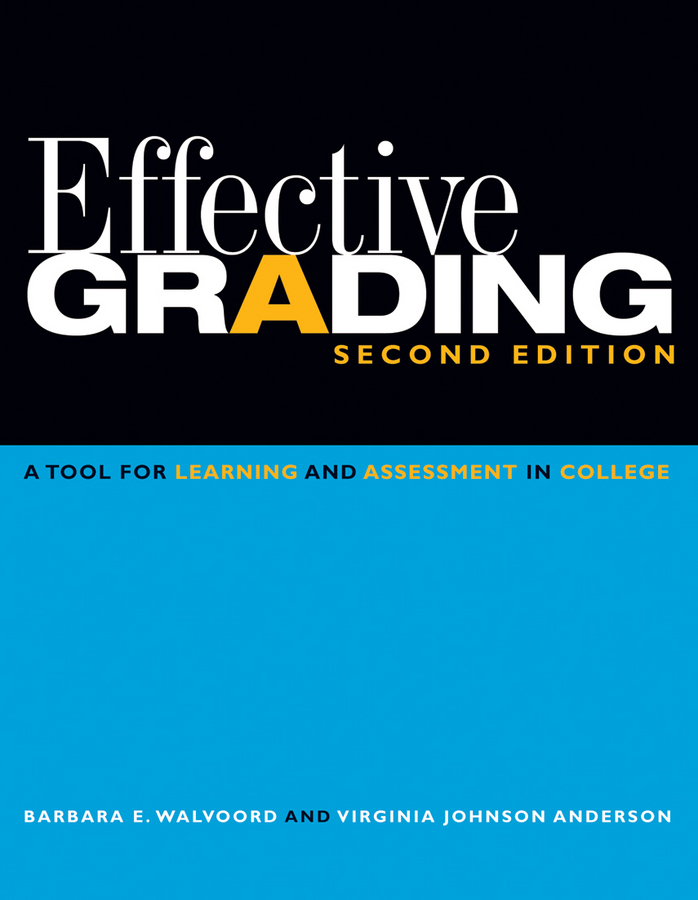Электронная книга: Walvoord Barbara E. «Effective Grading. A Tool for Learning and Assessment in College»

|
The second edition of Effective Grading—the book that has become a classic in the field—provides a proven hands-on guide for evaluating student work and offers an in-depth examination of the link between teaching and grading. Authors Barbara E. Walvoord and Virginia Johnson Anderson explain that grades are not isolated artifacts butpart of a process that, when integrated with course objectives, provides rich information about student learning, as well as being a tool for learning itself. The authors show how the grading process can be used for broader assessment objectives, such as curriculum and institutional assessment. Thisthoroughly revised and updated edition includes a wealth of new material including: Expanded integration of the use of technology and online teaching A sample syllabus with goals, outcomes, and criteria for student work New developments in assessment for grant-funded projects Additional informationon grading group work, portfolios, and service-learning experiences New strategies for aligning tests and assignments with learning goals Current thought on assessment in departments and general education, using classroom work for program assessments, and using assessment data systematically to «close the loop» Material on using the best of classroom assessment to foster institutional assessment New case examples from colleges and universities, including community colleges «When the first edition of Effective Grading came out, it quickly became the go-to book on evaluating student learning. This second edition, especially with its extension into evaluating the learning goals of departments and general education programs, will make it even more valuable for everyone working to improve teaching and learning in higher education.» —L. Dee Fink, author, Creating Significant Learning Experiences «Informed by encounters with hundreds of faculty in their workshops, these two accomplished teachers, assessors, and faculty developers have created another essential text. Current faculty, as well as graduate students who aspire to teach in college, will carry this edition in a briefcasefor quick reference to scores of examples of classroom teaching and assessment techniques and ways to use students'classroom work in demonstrating departmental and institutional effectiveness.» —Trudy W. Banta, author, Designing Effective Assessment Издательство: "John Wiley&Sons Limited"
ISBN: 9780470605417 электронная книга Купить за 3512.13 руб и скачать на Litres |
Другие книги схожей тематики:
| Автор | Книга | Описание | Год | Цена | Тип книги |
|---|
См. также в других словарях:
History of virtual learning environments 1990s — In the history of virtual learning environments, the 1990s was a time of growth, primarily due to advent of the affordable computer and of the Internet.1990s1990* Formal Systems Inc. of Princeton, NJ, USA introduces a DOS based Assessment… … Wikipedia
Discovery learning — is a method of inquiry based instruction and is considered a constructivist based approach to education. It is supported by the work of learning theorists and psychologists Jean Piaget, Jerome Bruner, and Seymour Papert. Although this form of… … Wikipedia
Chiropractic — Intervention A chiropract … Wikipedia
Education reform — is the process of improving public education. Small improvements in education theoretically have large social returns, in health, wealth and well being. Historically, reforms have taken different forms because the motivations of reformers have… … Wikipedia
Academic dishonesty — or academic misconduct is any type of cheating that occurs in relation to a formal academic exercise. It can include Plagiarism: The adoption or reproduction of original creations of another author (person, collective, organization, community or… … Wikipedia
Experiential education — is a philosophy of education that focuses on the transactive process between teacher and student involved in direct experience with the learning environment and content. [ Itin, C. M. (1999). Reasserting the Philosophy of Experiential Education… … Wikipedia
